- Home
- Cynthia Kadohata
Checked Page 19
Checked Read online
Page 19
“His face looks fine,” she says to me.
What? It’s like she read my mind!
“You can tell by their face how they’re doing, just like with humans.”
“Oh,” I say, and realize that she’s talking about Sinbad, not my dad. Then I notice that even under all that hair, her dog’s face looks pinched and old.
She sees me studying her dog and says, “She’s only four. How old is yours?”
“Maybe six, we’re not sure.”
“Heart dog?”
“I’m sorry?” I ask.
“Heart dog. That’s a once-in-a-lifetime soul-mate dog.”
“Yeah, he’s my soul mate,” I answer. “He bit me once when we first got him, but it wasn’t hard, and I didn’t give up on him.”
She nods, tears falling. “Greta is my heart dog. I’ve had about a dozen dogs in my life, but none like this.”
I’m not sure what to say. I try, “I’m sorry,” but I’m not positive that’s what I should have said.
She starts crying too hard to answer, and then we get called in to our appointment.
The tech weighs Sinbad—ninety-two pounds—and takes his temperature.
So, every time we go to the oncologist, the doctor looks at Sinbad’s weight and examines him, takes his blood, and then they give him the exact amount of chemo that he needs. The doctor is always happy with how he’s doing, even when I tell her he’s not doing so well.
Today Dr. Pierre enters with a smile. She gives me a quick hug, shakes Dad’s hand, then leans over and kisses Sinbad’s nose. I like how she’s sincere. I’ve been to a couple of vets who act like they love your dog, but you can tell they’re just acting. She feels Sinbad’s leg, then all over his body. “He’s doing great—he’s just doing fantastic! We couldn’t ask for more. This is quite literally the best we could have hoped for.”
I drop to my knees and hug Sinbad hard. “You’re kind of all better!” I look at Dr. Pierre. “Right?”
But Dr. Pierre says, “As I think I told you early on, remission isn’t exactly the same as being all better for dogs. In humans, sometimes we can say they’re cured. But for dogs, there is no cure.” She speaks gently, touches my arm when she sees I’m about to cry. “But he’s doing fantastic, basically as well as possible.
“Still, as I told you earlier, we need to continue the full six months of treatment. That’s how we do it here, just to make absolutely sure we’ve destroyed all the cancer cells. But he’s doing great!”
“So how long do you think he’ll be in remission? Five years?”
She pauses. “It’s possible, but . . . well, it’s possible.”
I think hard. “But probably shorter?”
She tilts her head. Frowns. Nods. “Unfortunately, that’s true. But he’s done fantastic. He’s in remission. Some dogs never go into remission at all. We really don’t have exact numbers, unfortunately. Patients always want to know exactly what to expect, but we just can’t tell them that.”
Dad clears his throat. “So even though he’s been in remission for a while, the cost will still be the same as you originally told us, somewhere around seven thousand?”
“Yes, I’m afraid so,” Dr. Pierre says.
“All right.” He rubs his temples hard. Nobody speaks for a full minute.
We sit in the waiting room while Sinbad gets his chemo. Afterward, like the doctor does every visit, she reminds me, “Make sure you use gloves when you handle the pills.”
“I will,” I say. “Thank you, Dr. Pierre.”
We leave the building and get into the car. Before Dad starts the car, I say, “I’m sorry it costs so much. But don’t you think he’s worth it, Dad? Don’t you?”
“Yeah, yeah, of course I do.” He half smiles at me and rubs my head gently. “He’s worth any amount, actually.”
I know it’s a lot of money, but at the same time I don’t have a real clear idea of how much exactly seven thousand dollars is. “So is that an incredible amount of money?” I ask. “Or sort of a lot? Which is it?”
“Ah, somewhere in between maybe,” Dad replies. “Can you open up a stick of gum for me?”
I give him gum, then take out my phone and work the calculator. Seven thousand dollars divided by twelve dollars I get for each car wash equals 583.33. If I do an average of three a week, which is the max I’ll probably have time for year-round, I can pay for Sinbad’s treatment in 3.74 years. Huh. I’ll be a midget by then. If he’s still alive, then it’s all good. I think about Dr. Pierre mentioning six months. If the worst happened and he died at six months, and I was still washing cars almost four years later, I wonder if I would become a bitter man. But there’s no telling how long Sinbad will live—it could be five years, if I pray a lot. . . . Of course, I don’t know if how long matters in terms of how I feel now. Now I just feel like I want to spend time with him and soak up his Sinbad-ness for as long as it lasts.
When we reach home, I spot Mr. Reynolds walking slowly back to his house. So I grab Sinbad and catch up with him. “Hi, Mr. Reynolds! Did you want me to finish cleaning up your kitchen?”
“Conor MacRae!” He chuckles. “I think you made it clean enough to last for a few years!”
“Great!” I say, but then think about all the gunk still left on the stove. Dad would have a rare meltdown if I left that kind of gunk on our stove at home. “I can finish with the stove. . . .”
He looks at me suspiciously. “Don’t you have grandparents or something?”
“Uh, I do, actually. I’m only friends with my dad’s parents, though, not my mom’s.”
“What?! That’s a tragedy! Why aren’t you friends with your mom’s parents?” His face is suddenly furious. “What’s the matter with you? I thought you were a nice boy!”
My mouth falls open, kind of surprised at how angry he looks. Then he ambles off, bitterly muttering, “What’s the matter with you?”
I’m still surprised, but I shake off his words so I can take Sinbad for a walk in peace. Afterward I give him his pills with Dad’s help, then sit next to him on the bed while he falls asleep. My mind drifts back to Mr. Reynolds. I start to wonder how clean my mom’s parents keep their kitchen. Like do some people just reach a point in life where they don’t give a can of beans how much gunk is on their stove? And I think about the way I would know my mom loved me, even if Dad hadn’t told me so. Don’t ask me how, but I can feel it, even today. I can feel it right now, at this exact moment, if I concentrate.
My mind’s a jumble. . . . Sinbad is so still it’s scary. So I love Sinbad and he loves me, and my mom loved me, and I still love her. But she’s gone, and Sinbad has cancer . . . but he’s in remission. So it’s all complicated, and it’s all a thick jungle in my head. And in my brain I keep seeing Mr. Reynolds’s kitchen. Then, just like that, the thought pops into my head: my mom would want me to know her parents. ’Cause they raised her, like she would have raised me if she could. ’Cause they’re Japanese, and I actually don’t know a single Japanese person even though I’m half. ’Cause maybe they’re lonely like maybe Mr. Reynolds is lonely. And most especially just ’cause it’s the right thing to do. You might not believe it, but there are some cops in the world whose main goal in life is just to do the right thing: That’s it.
Even if you don’t want to do something, sometimes you just gotta.
CHAPTER 37
* * *
OUR GAME SUNDAY is at noon in Simi Valley. I’ve invited Mr. Reynolds, and he comes, riding in the front seat with Dad, talking about why the blue tarp he bought back in September at a garage sale is better than the one he bought at the store later. It’s ’cause every year, they make things cheaper and cheaper. At least that’s what he says.
Simi Valley is north of Los Angeles, like we are, so the drive is only half an hour. I listen to Tupac, ’cause even though he probably hated police, he’s so real I love him, and that gets me ready for a game. The sky’s drizzling, but when we arrive a few minutes late, some of the guys are ou
tside doing light dryland. I rush out, dumping my bag on the asphalt. Dad picks it up and says he’ll take it in. Coach Kyle is there, talking to one of the parents. When he spots me, he asks, “How’s your brain?” He taps on my head a couple of times. “How many fingers do I have up?” He holds up two fingers.
“Two.”
“Wrong.” He pokes his fingers toward my eyes, then ruffles my hair.
He takes us through some yoga stretches. Whenever I look up, he seems amused.
“Man, you guys are stiff,” he finally says. “I want you to work on your stretching this week, because you’re embarrassing me.”
In the locker room, I get a sick feeling I don’t expect. I’ve gone back to a previous helmet, one that was uncomfortable but had the highest safety rating of any helmet available—though the reality is none are all that safe. I just feel scared. I feel really scared. I feel dread.
“Glad you’re back, man,” Jae-won is saying. “Keep your head up out there.” He knocks on my helmet. “You in there?”
I try to look calm, and give a fake smile. “Yeah, man, all good.”
Ryan tugs at his jersey. “Do you think this jersey is too small?”
Ryan is super picky about his gear. “Looks fine to me,” I say.
Then he grimaces as he buckles his helmet. “I think I need a new helmet—this one makes me look like a turtle. But my dad says it fits perfect.”
I retighten a lace and head to the rink. The Zamboni is still resurfacing the ice. As soon as it’s done, I zoom out and feel the air hitting my face. It feels so good that for a second I forget my fear. I take a couple of fast laps around our half of the rink before grabbing a puck and hitting a slap shot at the net. The other team looks bigger than us, and the fear returns. I don’t want to play a big team. Also, I always check stats on Fridays when they’re posted, and one of the guys on the other team has the highest penalty minutes in our division. I hate players like that. My future flashes through my mind: Bantam. Checking. Fear. I groan out loud and take another hard slap shot.
When the game starts, the coach doesn’t send me out for the first two shifts; I’ve been dropped to third line in my absence. That’s fair, I don’t have a problem with that. I’m playing with Scottie on D. Scottie’s one of the best defensemen, so it can’t be all bad. I lean over the boards and watch Jae-won on a breakaway—the guy defending him gets caught going for the puck and missing. Jae-won pretends he’s going for a wrist shot lower right and instead flicks it left top shelf into the net. A thing of beauty for sure! I pound my stick on the boards for him.
Then I’m out there, and I can’t believe how good it feels. I’m skating backward, flying really, for me. I’m really keyed in on my guy. Then I see a weakness and lunge for the puck, but my guy gets by me. I rush to the slot, but it’s too late, and he scores. Same mistake Jae-won’s defender made. I hear Coach shouting, “Conor, get off the ice!”
I skate to the bench. Coach turns on me and looks like he wants to yell but doesn’t.
I slump down, resting the back of my skull on the glass. But there’s no room for pouting in hockey, so I get up and hang over the boards again, watching the game. On the good side, getting schooled seems to have knocked the fear out of me—I just want to get out there and school that guy back. And I play great for most of the rest of the game. I’m rusty, but I make several excellent stops. There’s one point where I’m on their best player. He dekes left, but I’m suddenly so in the zone it’s like I’m reading his mind. I stay with him as he resets and pretends he’s going left again but goes right. I close in and knock the puck away, and Scottie grabs it and skates off and almost scores. When I get to the bench, Coach Dusan says, “Good work, Conor,” and pats my helmet. I feel like I’ve just won the Lotto, or an Oscar, or something big. The final buzzer sounds.
Unfortunately, bottom line is we lose by one goal—the goal that I gave up. So forget winning the Oscar. In the locker room after the game, Coach Dusan asks me, “Did you read the playbook or what?”
“I did read it,” I reply.
“Well, read it again. I don’t want you going after pucks you don’t have a seventy-five percent chance of getting. All right?”
“All right.”
“You played great for someone who’s been out three weeks.” But because this is hockey, he adds, “But you need to do better.” He takes a big breath and claps his hands once together. All the guys are looking at him. “Tough loss,” he says. “I’m not going to yell, because you played pretty good. We still need to work on our forechecks. F2 isn’t helping out enough, for one thing. He’s just standing there. Hockey is a game of constant motion.” Coach Dusan points to his head. “There are a million players with physical skills. In today’s game, you need to be smart. The smart players are the ones who are going to make it. All right? Use your brains out there.” Then suddenly he does yell: “USE YOUR BRAINS OUT THERE!” He walks out of the locker room.
We all get dressed without the hijinks you would expect if we’d won. Some teams I’ve been on don’t take it hard when they lose, but this team already seems like the opposite. Then Jeffrey says, “Thanks for nothing,” to me and turns to leave. Jae-won throws a glove that bonks off the back of Jeffrey’s head, and Jeffrey turns on me. “I’m telling the coach you did that!”
“That ain’t my glove,” I reply. “Tell him anything you want.”
Lucas says to me, “You played great, man.”
“Thanks.” But I get dressed in a hurry and leave.
In the car with Dad, Mr. Reynolds immediately says, “That puck is too small. Why don’t they make it bigger so people can see it?”
Nobody answers for a second, and then Dad says, “Yeah, I guess it’s pretty small.”
“It’s too small! Who can I write to to complain?” Then with a big effort, he turns all the way around and says, “You skate fast, young man. I’ll bet you play someday in . . . what’s it called?”
“The NHL?” I say.
“Wherever they play,” he says. “You must work hard. I should have known.”
Then we’re all quiet for a few minutes. “Wanna talk?” Dad finally asks, but I don’t answer. I open the window and let the air hit my face. That wasn’t the first guy who’s ever scored on me, not by a long shot. It was just that if I hadn’t lunged, I could have stopped him. I cost us the game. What if we eventually don’t make the play-offs by one game? My fault.
When we’re almost home, I ask Dad, “Did you ever make bonehead mistakes?”
“Everyone does,” Dad replies. “Everyone. I’m sure Coach Dusan made bonehead mistakes in his career. I know it’s cliché, but you just have to learn from your mistakes. In your case, over time you’ll get a better sense of when you should go for the puck. You’ll get a better sense of when you can actually get it. These are some talented kids in AAA. You’re just as talented, but you’re not used to the level of play yet. Don’t worry, you’ll get used to it. It’s like when minor-league baseball players move up to the bigs, they can’t see the fastballs. The pitches just whiz right by them.”
“Really? Coach says I shouldn’t go for the puck unless there’s a seventy-five percent chance of getting it. I remember reading that in the playbook, but how do you know it’s seventy-five percent when you make your move?”
“You don’t. You just develop a feel for how fast the other guy is moving and how fast you can move. It’s not exactly seventy-five percent. It’s using your judgment. You’ll get it.”
Mr. Reynolds turns all the way around again. “Did you do something wrong?”
“I let a guy score.”
“That’s the goalie’s responsibility! That’s his job!”
“Well, in this case it was actually my fault, not the goalie’s.”
He turns around again. “You skate faster than I drive, I can tell you that.”
I laugh, ’cause he drives so slow, and then I feel a little better. When we drop him off, he says he wants to come to another game someday
, but he needs a few weeks to warm up again. Then he asks, “Did you ever talk to your grandparents?”
“I’m going to see them on Thanksgiving.”
He smiles with satisfaction. “Always listen to Edwin Reynolds, you won’t go wrong.”
Dad just looks at me. “I decided,” I say, “but I haven’t told anyone yet.”
He nods. “Good deal,” he says. “Very good deal.”
As soon as we get home, I put the playbook in my backpack and bike out to the park with Sinbad. He’s winded, but I plan on staying for a while, so he’ll be able to rest. I stretch out in the grass and read for an hour while Sinbad alternately sleeps and barks at other dogs. Sometimes I read the same sentence over and over, and I still don’t get it, even though I got it a couple of months ago. It’s so frustrating I could scream. And then I do. I just let it out, halfway between a scream and a yell. As loud as I can. Sinbad sniffs me. “I’m okay,” I say.
I bike home, Sinbad loping happily next to me. Dad’s left for work, ’cause he took an extra shift this weekend to help pay for the chemo, so I’ll be eating my boiled chicken alone. I know Dad would pretty much work round the clock if he could. I rag on the crazed hockey parents sometimes, but the truth is, almost every single one of them is pretty great. There’s a small number who are too hard on their kids, and also some who complain about all the time they have to spend at the rink. We only had one bad parent last year. There was a guy on the team with a stepdad who already had two grown kids he was crazy about. He even had grandkids. And you could see he really resented all the time at the rink, all the money. Kind of like Jenny did, though she hardly ever came to the rink. I mean, I know ’cause we were in family therapy that you have to try to be positive about each other, and try to be interested in each other’s point of view. But the sad truth is, sometimes the stepparent-stepkid thing works out better than other times. Sometimes it works out great, and sometimes it doesn’t, just like anything. The therapist said that there are situations where the best you can hope for is that you all get along. Like forget loving each other, just get along. The guy last year was crying in the locker room one day ’cause he screwed up in a game and knew his stepdad was going to be smoking mad at him. I remember Lucas sitting next to him with his arm around him, not saying anything. That was funny ’cause the guy used to swear a lot, and Lucas never swears and probably never will. So they weren’t friends or anything. But there they were, Lucas acting like they were best buds. I guess that’s Lucas for you.

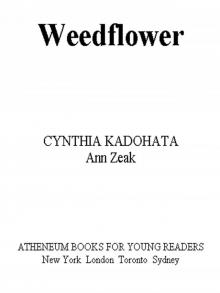 Weedflower
Weedflower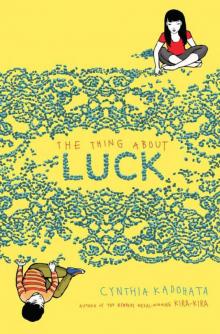 The Thing About Luck
The Thing About Luck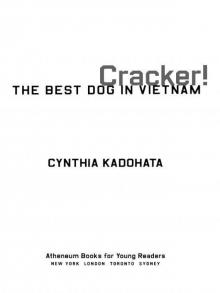 Cracker!: The Best Dog in Vietnam
Cracker!: The Best Dog in Vietnam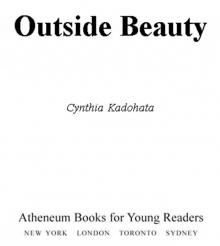 Outside Beauty
Outside Beauty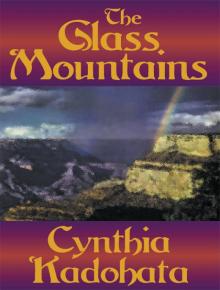 The Glass Mountains
The Glass Mountains Kira-Kira
Kira-Kira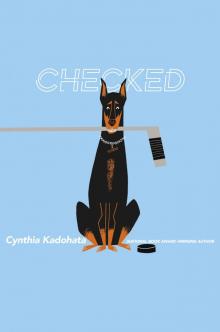 Checked
Checked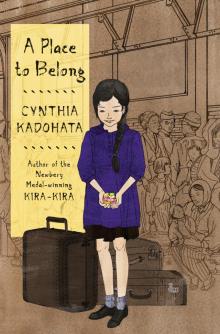 A Place to Belong
A Place to Belong A Million Shades of Gray
A Million Shades of Gray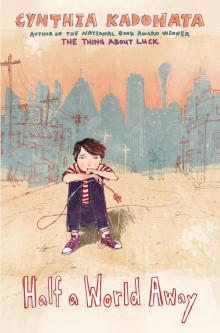 Half a World Away
Half a World Away